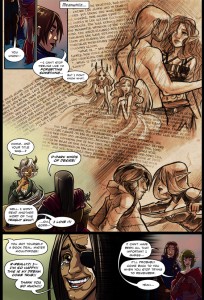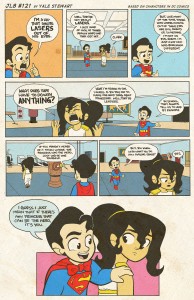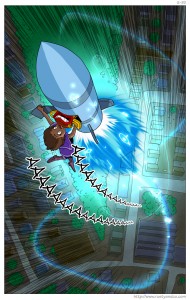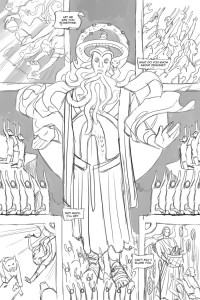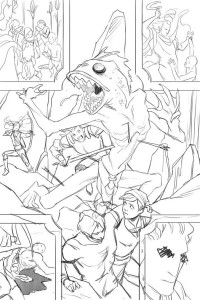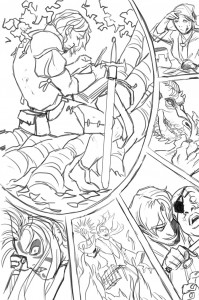The Cost of Doing Business
I am a man of few and meaningful fears.
I am a man of many and insignificant annoyances.
The former, I like to think I have a pretty good grasp on, since most people don’t seem to realize how terrified I am of certain subjects. The latter, though, I need work on. I can’t really help it; certain things just aggravate the everliving toadwarts out of me. I earlier, on Facebook, asked my readers if they had a favorite excerpt from The Skybound Sea that I could put up on a blog somewhere. This was quickly followed by a request for people not to make a joke by requesting “that scene with the guy with the thing.”
I stand by that. It’s a profoundly lame joke that I’ve heard a thousand times before. It’s supremely unhelpful and truly, truly epic in the breadth of its unfunniness. But even then, I had the feeling that I was being a tad unreasonable in being that snippy about it. After all, when you are an author (or a celebrity or any other kind of figure the public latches a claim on), you’re required to eat a little shit. It’s just inevitable.
Yet, I couldn’t figure out why it still bothered me until late last night when I watched an author meltdown.
I’m not going to link it here because I don’t want to hurt that author more than they already have been. I’m not going to link the arguments that led to it because I don’t want to address that specific discussion. I’m not going to really discuss that particular series of events at all because, chances are, if you hang out in the same circles I do, you’re already well-familiar with the ongoing debate of Authors vs. Reviewers.
But in case you aren’t, the gist of it is that authors shouldn’t comment on reviews of their own work.
This is, in general, good advice for several reasons.
It makes you look unprofessional.
It makes you look insecure.
It effectively derails the conversation from your work to you.
There’s no way you can win.
There’s no way you can emerge from it looking good.
These have been reiterated time and time again by professional bloggers and authors alike and I was very content to let it sit at that because, frankly, I didn’t feel as though I had much to add to the subject. That is, until last night, when I realized just why it is that lame jokes irritate me so much and why I think a key point is being missed in this particular debate.
Because, until last night, I don’t think I realized just how very precious and limited a resource a person is.
And that’s the crux of the matter: it is so very, very easy to lose yourself as a person when you’re a public figure. When people fling lame jokes at you, they’re not telling a joke for your benefit. When people bring up your work, they often forget that it was a person who wrote it. And when you wade into an argument about yourself, you tend to separate yourself from the author and the person and what’s left isn’t much.
I said I didn’t want to discuss the actual argument that led to this and I stand by that. In the interests of full disclosure, I’m friendly (if not good friends) with just about everyone involved and I don’t quite trust myself to be academic about it. But there was a phrase that was thrown about more than once that sort of hit it on the head.
“Quasi-mythical.”
The exact context for that was referring to how an author is basically held above the conversation by the audience due to success or prestige, even if their experience doesn’t reflect that, and thus they would be coming down and speaking from a position of power. But it’s apt for another reason: it’s quasi-mythical, so you don’t quite get the awe and admiration of a mythical creature (and to be honest, I don’t think a lot of authors are looking for that reverence), but it’s quasi-mythical, so you’re viewed as just one or two steps to the left or right of being an actual person.
And that’s when I realized why I couldn’t stand lame, obvious jokes. They weren’t jokes being made to me, as a friend would make to a friend, but jokes being flung at me, for the benefit of anyone watching. It’s the same reason it irritates me when I’ll be making an inside joke with a friend on twitter (frequently self-degrading) and someone I don’t know swoops in and picks up on it like it was meant for them.
Which, I guess, I can’t blame them totally. I am a public figure. I do invite attention to myself. That’s one of the main goals of being an author on social media. You can’t have it both ways, being in the spotlight and complaining that people are looking at you. But you can know when to duck out of the spotlight and that’s the whole point of this particular blogpost.
Because the price you pay for being in the spotlight is not necessarily dollars, nor even really respect, but personality.
And sometimes, that price is just too great.
I’ve put forth the idea before (and in this very post) that a person is a finite resource and that, I think, is what makes me want to write this. Not to address reviewers, nor even authors who are already published, for aspiring authors who may one day find themselves in this particular position. Because eventually, you’ll be tempted to respond to a reviewer. It’s an urge that’s frequently understandable, but not for the reasons people have already listed.
When we respond to reviewers, I think subconsciously we aren’t trying to demonize them, but in fact are trying to do the opposite: humanize them. Turn them from a faceless jerk saying nasty things to a person with an opinion that we can understand, even if we don’t agree with them. That, at least, has been my rationale when I’ve responded to reviewers (privately, in email) and I find that to be an okay way of going about things.
But I don’t do it anymore.
I don’t read my reviews. I don’t read conversations about me. I don’t go on Goodreads. I try to avoid Amazon when I can.
Because when I first started out in publishing, I made a deal with myself: if it wasn’t fun, I wouldn’t do it. If the lame jokes on twitter annoyed me more than I enjoyed the friendships, the fan interaction, the professional networking and genre discussions, I wouldn’t do it. If the depersonalizing aspect of Facebook made me more uncomfortable than the chance to see someone post on my wall “I loved your book!” made me ecstatic, I wouldn’t do it. As a result of Goodreads making me feel like an object instead of a person, I don’t go on there. Nothing personal to you Goodreads users: it’s an awesome site, but it’s just not for me.
Only now, about three years into publishing, do I realize the wisdom of this approach.
It’s not merely a matter of stress, nor merely of professionalism (though these are both huge issues that shouldn’t be discounted). Rather, it’s a matter of preserving my precious, precious personality. I hesitate to call it self-defense, though I’m fine with the idea of calling it resource management.
Bear with me through this next part, because it will sound a little odd. But if you look at yourself as a finite resource, then it’s easier to divide yourself up (at least, as far as authors go).
Anywhere from 50%-90% of yourself will go to your work (for purposes of this exercise, let’s say you’re more dutiful than most and are dedicating about 75%).
So, that leaves 25% left. 10% of that will go to the public, through social media, appearances and generally putting on a brave face. Of the remaining 15%, 10% will go to lives, loves, hobbies and personal interests (this is the part you’ll share with people).
That remaining 5%? That has to be for you and you alone. That has to be the one scrap of yourself that you hold onto as tightly as humanly possible and never, ever let go of.
And that’s also the part we give away when we get into fights about our own stuff. That’s where we give away our fears, our insecurities, our lusts and our passions. And it comes out as misunderstood and ugly because, how could it not? That’s the part of us that will only make sense to us because it’s so incredibly intimate.
I suppose I took a very long time to explain that. But then again, these blog posts are as much for my own benefit as they are for yours. And I hope that this has been of some benefit to you, aspiring authors and sensitive readers, in explaining possibly where we come from and why things like author meltdowns happen.
It’s not your fault. It’s nobody’s fault, really. I hesitate to say it’s the author’s fault, since so many of them (myself included) aren’t quite sure what they are and thus have a hard time qualifying what they can and can’t give away.
But, speaking as a man with few, significant fears?
Don’t do it.
You’re too precious to give it away.
The Cost of Doing Business Read More »

